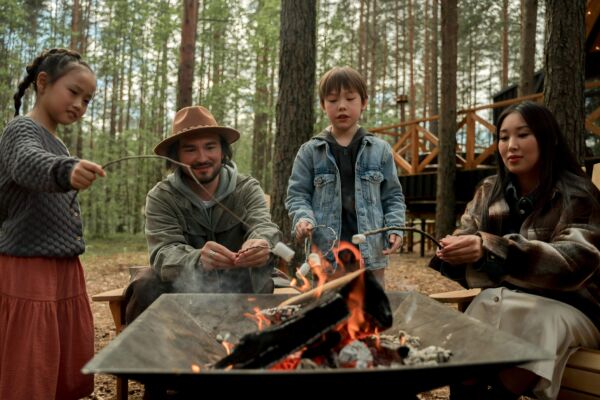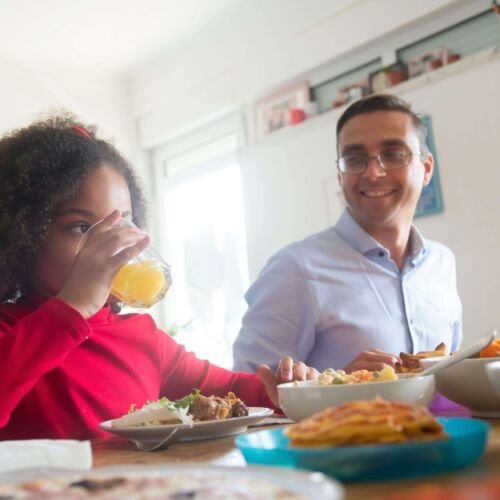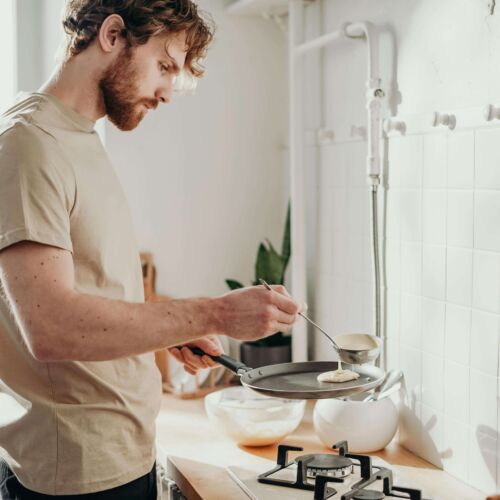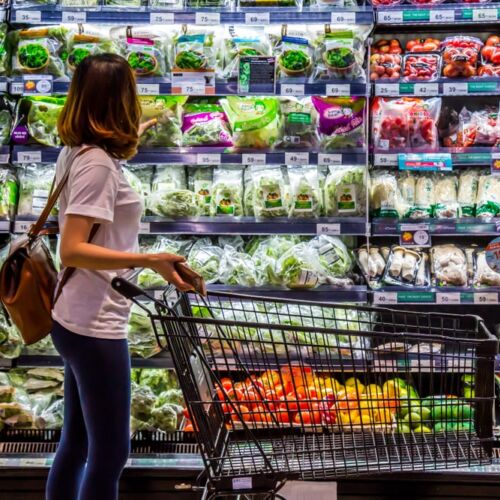Nutrition for Camping
by Anne M. Mahon, RD, MSPH

Ah, the family camping trip is finally here—it’s time to pack up and head into nature! You’ve got your tent, sleeping bags, and s’mores fixings. But what else should go into the cooler?
Camping is a time to make special memories with family and friends, but it also means a big shift in your usual routines—especially when it comes to cooking and eating. What works in your home kitchen may not translate well to the campground. While meal planning is always useful, it becomes essential when you’re far from a stocked fridge or grocery store. Asking a few key questions ahead of time can help you pack food that enhances your experience and cuts down on stress for whoever’s in charge of meals.
What amenities do you have?
Whether you’re camping in an RV, a tent, or on foot, you won’t have access to your full kitchen. Consider the following:
- Storage: Do you have several coolers, a fridge, or a freezer? If so, frozen meals like breakfast burritos, chili, or soup can save time. Otherwise, focus on shelf-stable items like oatmeal, tuna, jerky, nuts, dried fruit, canned soups, and fruits such as apples and oranges that can survive being at room temperature for a few days.
- Cooking: What equipment do you have—pots, pans, camp stove? Is there electricity at your site? Are fires allowed? Knowing how you’ll cook and what tools you’ll need makes packing easier and helps avoid last-minute scrambles for forgotten spatulas or hot pads.
- Cleanup: Will you have access to running water, or will you need to haul it in? What’s your plan for grey water disposal? Prepping food at home can minimize cleanup—cut up veggies, pre-dice onions, and bring easy snacks. Don’t forget eco-friendly dish soap, salt or baking soda for scrubbing, and a large container for washing dishes, as well as hand sanitizer and a tablecloth for during meals.
Food safety can be trickier at the campground, but with some advance planning, you can avoid any upset tummies and undue stress.
What are your usual dietary habits and goals?
A change of scenery often means changes in eating, but that doesn’t mean abandoning healthy habits. Think about fruits and veggies that store well without refrigeration: apples, carrots, cucumbers, peppers, and oranges all hold up nicely. Tomatoes, bananas, and pears may require a little more care. Try to build meals around the Healthy Eating Plate—can you add extra veggies to chili, or swap out a PBJ for hummus and veggie pita wraps one day? And yes, an evening s’more can absolutely be part of a balanced trip, especially if the rest of your meals are packed with nutrients.
What activities will you be doing?
Are you planning long hikes, laid-back campfire chats, or a mix of both? If food is part of the entertainment, go ahead and bring the ingredients for that peach cobbler or fire-pit stew. But if you’re heading out at sunrise, quick options like breakfast bars and coffee might be the way to go. I like to pack a mix of easy-to-prep meals and those that create time for lingering together. For fishing trips, consider on-the-go breakfasts and dinners, with lunch as your main sit-down meal around the fire.
Sample Camping Meal Plan
| Activities | Breakfast | Lunch | Dinner | Snacks | Cooking Gear |
|---|---|---|---|---|---|
| Long hike in the morning | Breakfast bar, coffee | Hummus/pita/spinach wraps | Chili with corn chips, s’mores | Energy bites, gorp, apples | Bowls, large pot |
| Campsite & swimming in the afternoon | Pancakes Melba with peaches, Greek yogurt, berry sauce | Build-your-own salad bowls (pre-chopped veggies) | Brats and sauerkraut, Dutch oven cobbler | Fruit, nut, and cheese board | Dutch oven, hot pads |
| Fishing in morning | Overnight oats, coffee | Sandwiches, pickles, carrot sticks, mandarin oranges | Blackened trout, instant brown rice, steamed broccoli | Chips with bean dip and salsa | Aeropress, spices, oil for cooking fish |
A bit of thoughtful planning goes a long way when it comes to nutrition in the great outdoors. With the right mix of convenience and nourishment, you’ll spend less time stressing over food—and more time soaking in the beauty of nature and the companionship of friends and family.
Anne M. Mahon’s Bio:
I love food. I love cooking new recipes, lingering over fondue with friends, and enjoying holiday specials such as turkey and pumpkin pie. I even like grocery shopping! However, I also agree with Hippocrates when he said “let food be thy medicine, thy medicine shall be thy food.” Food brings us pleasure, but it can also bring health or pain depending on the choices we make each day. As a high school and college swimmer, I noticed a significant difference in my performance when I was eating well, and when I was eating junk. I was hooked on nutrition from then, and received a B.S. in dietetics at Michigan State University. During my four years as an Air Force dietitian, I was able to work with military members and their families, including athletes, retirees, and even babies. Regardless of a person’s health status or age, nutrition made a difference in their quality of life.
After my time in the military I studied public health at the University of Utah and received my MSPH in 2007. Of all I learned in graduate school, the two most valuable lessons were 1) nutrition information is only as good as the source, and 2) even the best nutrition information is worthless if it is not put into practice. There is some wonderful research out there, but it can be difficult to understand and apply…and there is also a LOT of misinformation that many people have tried, resulting in negative health effects.
Now as a full-time mom to three lovely children and a wife to one amazing man, I strive to apply evidence-based medicine and the latest research in prevention to developing healthy, sustainable habits for our family. My desire is to provide quality nutrition information and recommend simple, sustainable lifestyle changes that normal people, like us, can apply to improve their health.
Check out Anne M. Mahon’s website for more blogs, recipes, and nutrition information.
Images: From Unsplash and Pexels
The Site is not intended to be a substitute for professional advice. Under no circumstances will we be liable for any loss or damage caused by your reliance on information obtained through the Site. You are responsible for evaluating the accuracy, completeness, or usefulness of any information, opinion, advice, or other content available through the Site. Please seek the advice of professionals, as appropriate, regarding the evaluation of any specific information, opinion, advice, or other content. Never disregard professional advice, including medical advice, or delay in seeking it because of something you have read on this Site.



